argentina
Diego Maradona Signed 2001 Argentina Farewell Testimonial Shirt AFTAL COA







Diego Maradona Personally Signed 2001 Argentina Farewell Diego Testimonial Shirt. This item has been signed by Diego, it is an incredibly rare shirt never mind signed by the great man himself. Rrare shirt worn in Maradona’s farewell match that was played on the 10th November 2001 at La Bombonera. The match was contested by the current Argentina team led by Diego and an All-Stars XI which featured famous stars such as Cantona, Stoichkov and Higuita. Maradona scored twice as Argentina won 6-3 in an emotional game that celebrated the career of the all-time great and national hero. It comes with a LIFETIME COA (Certificate of Authenticity) as standard. Listing and template services provided by inkFrog. The item “Diego Maradona Signed 2001 Argentina Farewell Testimonial Shirt AFTAL COA” is in sale since Tuesday, November 24, 2020. This item is in the category “Sports Memorabilia\Football Memorabilia\Autographs (Original)\Signed Shirts\Retired Players”. The seller is “pieceoffame” and is located in Braintree, Essex. This item can be shipped worldwide.
- Object: Signed Shirt
- Options: Premiership Players/ Clubs

1851 Signed Jose Concha Argentina Born Prime Minister of Spain Archive 20 Docs

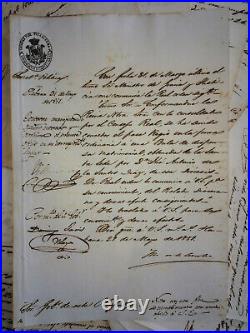
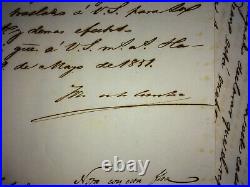
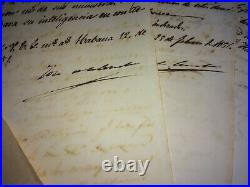
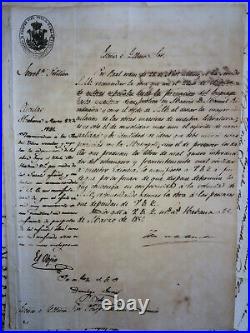
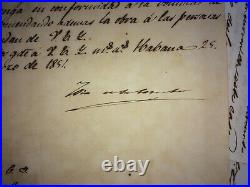
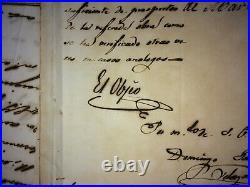
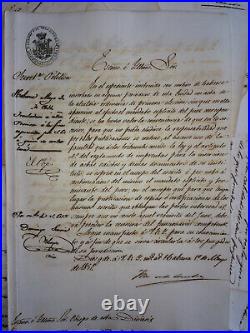
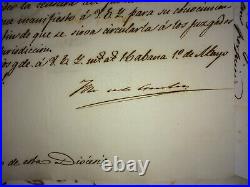
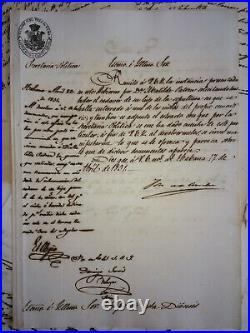
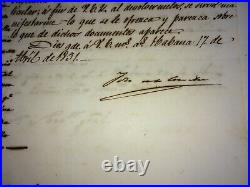

1851 Archive of 20 Docs Signed by Jose de la Concha Argentinian Born Prime Minister of Spain. He also served as Prime Minister of Spain. José Gutiérrez de la Concha e Irigoyen, Marqués de La Habana. Cohesive archive all from 1851. Each document signed by Jose de la Concha. Other signatures including from Bishop of Havana’El Obispo’. Twenty documents written in Havana. Total of 36 pages of text. José Gutiérrez de la Concha and Irigoyen, marquis of Havana. Military, politician and Spanish colonial governor. His mandate in Cuba was characterized by brutal repression, an example of this was the shooting of Narciso López after his failed expedition. When Federico Roncali ceased command in Cuba, José Gutiérrez de la Concha assumed as general captain and governor, taking office on November 13, 1850. The captaincy of Cuba was agitated: the revolutionary seed paid as a result of the tyrannical and omnimous actions of Tacon and O’Donnell had germinated. The random situation of the country demanded the presence of a man of firm character, severe resolution and foresight talent, but General Concha was far from possessing these qualities. Concha was accompanied by a commission responsible for directly observing the prevailing conditions in order to propose the necessary economic, political and administrative measures to achieve a readjustment of the colonial structures of government and to conjure the annexationist danger. In an address to the country aimed at taking possession of the Captaincy General, Concha said that he had the firm resolve to apply all the rigor of military laws to those who dared to attempt against the rights, which he deemed of course sacred, of the Bourbon branch for him. The man who spoke like this was preceded in Cuba by the fame of a sincere liberal, without bending or hesitation, so honest people welcomed him with respectful affection, even after the displacements of his aforementioned address. His liberalism translated into very little. He only admitted in his treatment and friendship to a man of advanced ideas, Ramón Pintó, Catalan with a respectable family and deep roots in Havana. The studies carried out by said commission, as well as the advice that Concha sought in notable figures of the ruling class of Cuba, turned his government into the initiator of a line of concessions and reforms of the mechanisms of the colonial apparatus based on a close alliance with the Hispanic and Cuban oligarchy of the Island. Its policy was closely linked to the promotion of private investments, which is why the management of the colonial Stadium was conceived as a guarantee of both the internal order and the effectiveness of its administrative and development mechanisms of the infrastructure. The tendency towards privatization and the protection of capital investment, together with a new sugar boom, had its immediate effects, not only economically, but also politically. Concha’s memories remained in Cuba’s government. His irresolute and dispossessed conduct of a true criterion of justice was consistent with the tone of the threats made in his speech when he took office. Port-au-Prince and Trinidad suffered the effects of their draconian procedures. On May 19, 1850 Narciso López, landed in Cárdenas with an expedition of about 610 men, of which only five were natural Cubans, with the purpose of proclaiming a free state, which, in the likeness of Texas, later requested his incorporation to The USA. In history there was more the memory that our current national teaching was hoisted there for the first time. In August of the following year he landed by Pinar del Río with another expedition, whose forces were soon exterminated, and Narciso López and other expeditionaries suffered death penalty in a vile club on September 1, 1851. On July 4, 1851 Joaquín de Agüero with about 60 men gave the shout of independence at the San Francisco del Jucaral estate, in Camagüey, in support of Narciso López’s expedition, whom he assumed had already landed successfully, drafting a Declaration of Independence. On July 23 they were captured, and on August 12, Agüero and two other patriots were shot. While O’Donnell was in command, he soon appointed Concha as Captain General and Governor of Cuba, replacing Juan González de la Pezuela, taking office on September 21, 1854. His second term was surrounded by social, economic and political problems that he did not know how to solve. During his tenure the assassination of the independentista Castañeda and the executions of DStrampes and Pintó took place. On February 6, 1855, Colonel Hipólito Llorente began to instruct cause by conspiracy to make the independence of the island of Cuba, ordering numerous arrests both in Havana and inside. The first to be arrested were Ramón Pintó (who had been a friend of Concha), Juan Cadalso and Dr. Once the Council of War was constituted, after deliberation, it requested the death penalty for all three. The auditor, Miguel G. Gamba, considering the sentence unfair, requested that his approval be suspended, but General Concha, who approved the death sentence, in vile club, of his friend Pintó, did not pay attention. And that of ten years in prison, in Ceuta, de Cadalso and Pinelo. On March 22, 1853, Ramón Pintó was executed and on March 31, Francisco José D’Strampes. In the economic field, the rise in prices and demand for sugar caused a state of prosperity from 1854 to 1856, which resulted in the development of numerous financial institutions and the corresponding investments. Such was the confidence of capital that, in the space of one year, 136 banks and corporations were founded. However, in 1857 an economic crisis caused the ruin of many of these investments, but the sugar and banking companies benefited from absorbing the properties of those who could not pay the loans. On September 2, 1858, the public streetcar service was inaugurated in Havana, and on October 5 of that year the Spanish Government approved the solution of engineer Francisco de Albear to supply water to Havana. José Gutiérrez de la Concha, having found no solution to most of the problems, ceased to be Governor and Captain General of Cuba in his second term on November 24, 1859, when Francisco Serrano y Domínguez assumed command. When Joaquín Jovellar y Soler ceased command in Cuba, José Gutiérrez de la Concha took over as Captain General and Governor, taking office on April 6, 1874. While in its previous mandates the independence and revolutionary spirit was brewing in Cuba, in its third term Concha had to face the libertarian war at its peak, which had begun six years earlier, in 1868, with the uprising of Carlos Manuel de Céspedes and other patriots. Máximo Gómez had penetrated Camagüey, initiated an invasion towards the center of the island, and in March 1874 he had fought in Las Guásimas the most important battle of our independence wars against a column of 3,000 Spanish troops causing him 1037 casualties. Many other actions occurred that year and the following, both of Concha’s mandate: attacks on Cascorro and Nuevitas and fighting in Camujiro and Los Alacranes (near Camagüey), in Hungary, Manaquitas, Vegas de Castaño and La Crisis (Sancti Spíritus), while in the eastern area Vicente García, Antonio Maceo and others also fought heroically. It is not known which victories against the rebels gave him the “merits” for which he was awarded the Great Cross of San Fernando and the titles of “Viscount of Cuba and Marquis of Havana”, because at that time he was 65 years old age, too many to go chasing the mambises by the manigua. José Gutiérrez de la Concha ceased as governor and captain general of Cuba in his third term on March 1, 1875, when he assumed command Cayetano Figueroa and Garahondo, which only lasted for a week, until March 8 he held the position gubernatura Blas Villate and de la Hera, count of Valmaseda. Condition; Very good with just minor wear. The item “1851 Signed Jose Concha Argentina Born Prime Minister of Spain Archive 20 Docs” is in sale since Thursday, March 5, 2020. This item is in the category “Collectibles\Autographs\Historical”. The seller is “old_world_collectibles” and is located in Toronto, Ontario. This item can be shipped worldwide.
- Country/Region of Manufacture: Spain
- Original/Reproduction: Original
- Signed by: 20 x José Gutiérrez de la Concha
- Autograph Authentication: Dariusz Wojcik Authentication (DWA)



